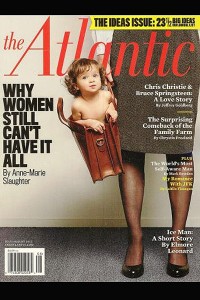I read Gregg Easterbrook’s NFL column partly for the football content and partly for the very-much-not-football stuff. Here’s an example from this week’s column where he reflects on the “having it all” meme:
Lately The Atlantic has been on the case of après-feminism. Hanna Rosin’s 2010 cover story showed how the double-XX cohort is taking over colleges and offices, positing trends in education and economics are such that “modern postindustrial society is simply better suited to women.” Those sci-fi stories set on worlds ruled by Amazonian females, where males exist solely for women’s amusement? Rosin sees this coming.
Then in 2011, an Atlantic cover had Kate Bolick declaring that men are already so inutile, a woman would be a fool to walk down the aisle. Her ideal evening: a romantic candlelit dinner for one. Bolick praised “the Mosuo people of southwest China, who eschew marriage and visit their lovers under cover of night.” That cheerful article ended by endorsing the Beguines, a Dutch order whose members live in secular chastity, vowing never to touch men.
Then this year came “Why Women Still Can’t Have It All,” a cover by Anne-Marie Slaughter, a Princeton dean and recent State Department official. Slaughter filled 14 magazine pages with angst about how despite a high-paying super-elite job with lifetime tenure, personal connections in the White House and a husband who does the child care, despite writing about herself for the cover of the world’s most important magazine, nevertheless she feels troubled that every moment of her days is not precisely what she wants.
The assertion that women “can’t have it all” was received as earthshaking by the commentariate, a magazine article making the front page of The New York Times. Living a favored life and yet looking for something to complain about is part of the Upper West Side mindset, so perhaps the Slaughter article appealed to the part of the Times demographic that searches desperately for new complaints.
 Some of Slaughter’s points were solid, but they were the grievances of the 1 percent — 99 of 100 women would love to have what Slaughter presented as her burdens to bear. Nobody’s ever satisfied. Jacques Brel wrote, “Sons of the thief, sons of the saint/Where is the child without complaint?”
Some of Slaughter’s points were solid, but they were the grievances of the 1 percent — 99 of 100 women would love to have what Slaughter presented as her burdens to bear. Nobody’s ever satisfied. Jacques Brel wrote, “Sons of the thief, sons of the saint/Where is the child without complaint?”
What was vexing was that the article seemed to misunderstand its own topic. The phrase “having it all” meant a woman could pursue a career and also be a good mother. This is something millions of women have now achieved, proving career and motherhood are not mutually exclusive, as men long claimed in order to keep women out of the workplace. But “all” never meant a woman could have everything she wants at every second without ever facing hard choices or bending over to pick up a piece of laundry. Men can’t “have it all” in that sense either. No one has ever “had it all” and no one ever will.
The Atlantic‘s female readers have been told they finally hold the upper hand, but this seems hollow victory if men become motes. They’ve been told marriage is so awful, get thee to a nunnery. And Atlantic‘s female readers have been told if they achieve tremendous career success under ideal conditions while miraculously finding the last desirable man on planet Earth, they will be riven with anxiety anyway. But hey, have a nice day!

 Some of Slaughter’s points were solid, but they were the grievances of the 1 percent — 99 of 100 women would love to have what Slaughter presented as her burdens to bear. Nobody’s ever satisfied. Jacques Brel wrote, “Sons of the thief, sons of the saint/Where is the child without complaint?”
Some of Slaughter’s points were solid, but they were the grievances of the 1 percent — 99 of 100 women would love to have what Slaughter presented as her burdens to bear. Nobody’s ever satisfied. Jacques Brel wrote, “Sons of the thief, sons of the saint/Where is the child without complaint?”

